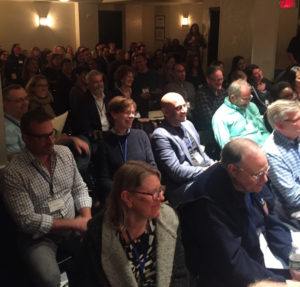 What’s the secret of success for a story? That’s the mystery I tried to solve when I interviewed Weike Wang this past weekend at the Gotham Writers Conference. The answer may vary depending on the story, but I hoped to find insight that would be useful to other writers.
What’s the secret of success for a story? That’s the mystery I tried to solve when I interviewed Weike Wang this past weekend at the Gotham Writers Conference. The answer may vary depending on the story, but I hoped to find insight that would be useful to other writers.
Weike released her novel Chemistry in 2017. She got written up and reviewed in all the good places (New York Times, New Yorker, etc.). The novel won a Whiting Award for emerging writers and the PEN/Hemingway award for debut novels (awards that have been won by the likes of Jhumpa Lahiri and David Foster Wallace). Most importantly, lots of people read and loved her novel.
Why this book? How can you score big with your work?
Chemistry doesn’t have a flashy hook—no murders, ghosts, or shocking twists. It’s about a young woman getting a graduate degree in chemistry who sinks into a depressive funk and looks for a way out.
It starts like this:
The boy asks the girl a question. It is a question of marriage. Ask me again tomorrow, she says, and he says, That’s not how this works.
Diamond is no longer the hardest mineral known to man. New Scientist reports that lonsdaleite is. Lonsdaleite is 58 percent harder than diamond and forms only when meteorites smash themselves into Earth.
Already, you can see some of the novel’s unique properties.
It’s written in a spare style. Weike said she would whittle until she had eliminated all the parts that a reader might skim.
Also, she frequently tosses in scientific factoids that reflect on the story. Intriguing, but also we sense the protagonist is using them as a defense mechanism against her emotions.
And the story bounces around a lot—between the main story, the past of the protagonist, and these science tidbits.
Weike’s editor suggested normalizing some of the book’s oddball qualities, but Weike said it was important to stick to her guns, her vision.
Plus, it’s funny. Here the protagonist is talking to her shrink who wants her to find a hobby:
Some people garden.
Plants hate me.
Or travel.
Where would I go?
Or photograph things.
What things?
Anything you want.
I don’t know what I want. Isn’t that why I’m here?
Then…
The shrink excuses herself to get water. I see her shadow return but linger a few seconds outside the door.
My theory on the book’s secret to success. Two things.
It’s singular. All those unique properties bring a freshness to the storytelling.
It’s entertaining. Though the book is about something dark (depression), it’s fun to read on every page.
Those two qualities—singularity and entertainment—would enhance any story. It’s almost a scientific fact.

Alex Steele
President, Gotham Writers Workshop


